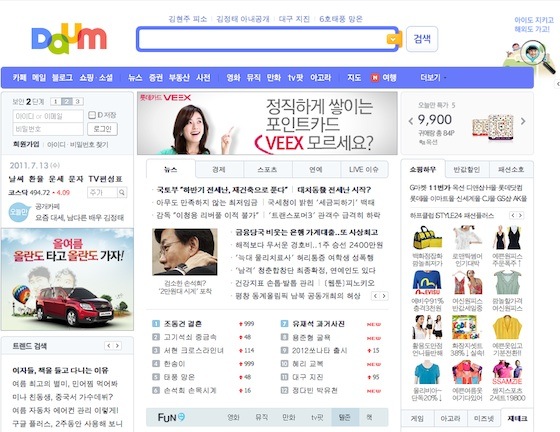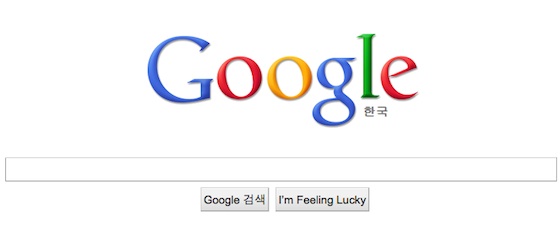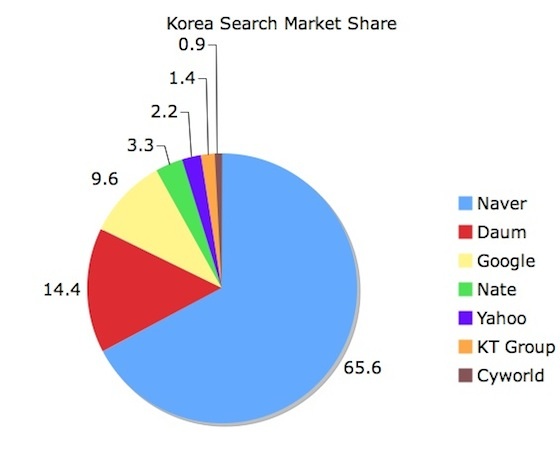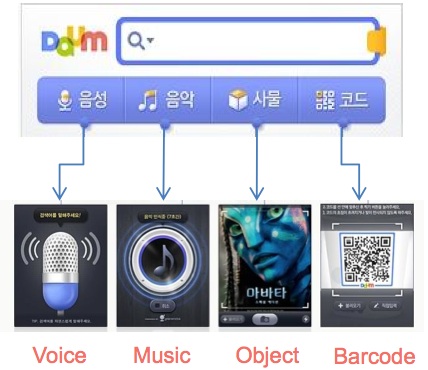A quick way to understand search in South Korea is to first examine what its top search engines Naver and Daum look like. Naver is Korea’s biggest search site and a typical homepage is filled with news, information, and online shopping.

Daum, the second biggest search site in Korea, is similar in design. It also features real time and social networking on its landing page, such as the top 12 real-time search keywords and real-time broadcasting contents.
In January, Daum partnered with Twitter to allow Korean users log in its portal and the microblog simultaneously to update their tweets. Based on its social web search technology, top Twitter users from Korea will be displayed on its front page in real time.

And this is what you get when you go to Google Korea:

As illustrated above, these Korean companies aren’t just search engines but portal sites that offer a range of services (e.g., news, email, shopping, blogging, social networking).
South Korea is another market similar to China where local search sites dominate. The three key search portals in Korea are Naver (65.6 percent), Daum (14.4 percent) and Nate (3.3 percent), while Google (9.6 percent) and Yahoo (2.2 percent) trail behind the incumbents in the country, based on comScore stats.
 Source: comScore May 2011 Share of Searches in South Korea
Source: comScore May 2011 Share of Searches in South Korea
Naver vs. Daum
Naver belongs to NHN Corporation, which has a presence in Korea and Japan. In its home country, Naver gets 12 million search users and 130 million search queries daily, according to its corporate site.
Although Daum’s market share is lesser than its rival, the company revealed in its latest investor presentation that one of its search strategies for 2011 is to expand search to new devices.

On mobile handsets for example, Daum will be able to offer voice, music, object, and barcode search. Additionally, Daum said the number of local advertisers for its local search services has been increasing rapidly.
According to Antony Yiu, regional director for North Asia, Hong Kong MD and ClickZ.Asia columnist, he said that the biggest difference between Naver, Daum, and Nate is that Naver doesn’t have a video sharing service. However, Naver has the largest blog network and its own social networking service Me2Day, which launched two years ago and has 5.5 million subscribers as of March 2011.
While Daum has a similar business model to Naver, Yiu points out Daum has a strong web-opinion board community and blogosphere compared to its rival. Daum TV is the second largest video sharing service in Korea after YouTube and the search portal has its own SNS called the Yozm. Although Nate has Connect, Yiu said Naver’s Me2Day is a useful ad platform.
In terms of how these local search portals differ from international engines such as Google and Yahoo, which feature paid and search results, local SERPs of popular keywords are filled with keyword ads and shopping links that each portal serves, he explained.
Unlike Google, Naver’s goal is to keep users on its portal as long as possible because ad revenue is dependent on how long they stay and the number of pages visitors view on its portal. Seoung-A Yoon, associate manager at Performics, shared an anecdote that Koreans like to joke that they visit Naver when they are bored as it provides lots of interesting information and is a great way to pass time.
SEM in Korea
In January, Naver replaced Overture’s CPC search platform with its subsidiary NBP (NHN Business Platform). Industry analysts were concerned this would cause Overture’s PPC to plummet and advertisers to run advertising on one portal only. However, Daum announced an alliance with Nate a few months later and analysts from Samsung Securities noted Daum received wider search ad exposure after the tie-up and advertisers appear to be increasingly using multiple portals.
Apart from CPC, a unique feature of buying search advertising in Korea is that local engines offer CPT (Cost Per Time) buy. For Naver, Yoon advised advertisers with high impressions that their brands can consider its Brand Search product, which features video and multiple links as illustrated in this search results page for as Samsung:

Yiu shared another tip for planning paid search campaign in Korea. “Because local search engines focus a lot on PPC and they all offer their own blogging services, having both PPC and a viral campaign for generic keywords is very important,” he said.
Despite the dominance of local search portals such as Naver, Daum, and Nate, the number of active users in Korea on U.S. social networking sites such as Twitter and Facebook are increasing rapidly, but that will be a separate story – stay tuned.



 Source: comScore May 2011 Share of Searches in South Korea
Source: comScore May 2011 Share of Searches in South Korea
